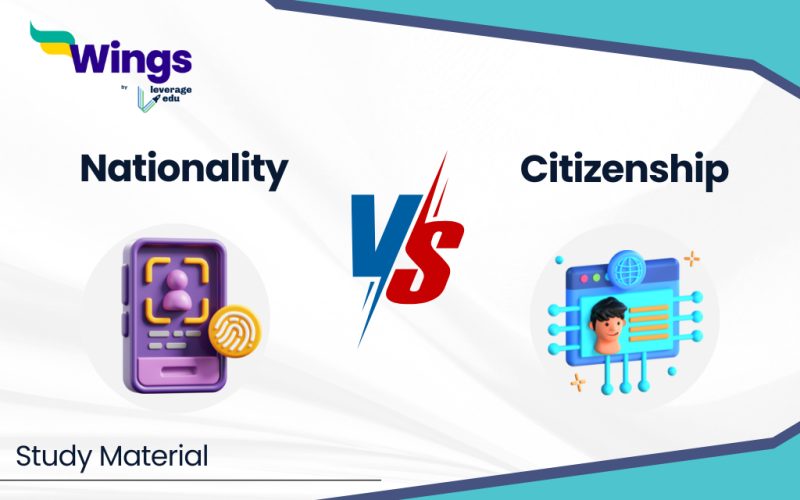Many people often confuse the terms ‘nationality’ and ‘citizenship,’ and it’s important to understand the difference between the two. Nationality refers to the country a person is born in, their birth nation, and where they naturally belong. On the other hand, citizenship is obtained by meeting all the necessary legal requirements of a specific nation, which then grants the individual the status of a citizen of that country.
To make it easier, nationality is in connection with your nation, where your ancestors came from, or where you were born. Now, citizenship is different, it requires legal formalities to be fulfilled if a person wants to become a recognised citizen of that country.
Table of Contents
What is Nationality?
Nationality is determined by a person’s place of birth, to which they are inherently connected. It is the legal relationship between an individual and their nation of birth. A person’s sense of belonging is tied to their nation, and as a member of that country, they are entitled to certain rights and responsibilities. Nationality is an integral part of one’s cultural identity.
Nationality is a fundamental human right. “United Nations Universal Declaration of Human Rights” (1948), states, “Everyone has the right to a nationality,” and “no one shall be arbitrarily deprived of their nationality.”
What is Citizenship?
To become a citizen, an individual must fulfil specific requirements set forth by the government of that nation. It is a status that indicates your legal citizenship within the nation. You have specific rights, obligations, and privileges in the political community as a citizen of the nation. Being a citizen comes with obligations and rights, including:
- Right to vote,
- Right to hold public office, and
- Duty to obey the law
Also read: What is the Difference Between H Beam and I Beam?
Difference between Nationality and Citizenship
The confusion between nationality and citizenship is a very misinterpreted word, and that is why it is important to know the difference between the two of them. Below is the table mentioned, which will help you understand the difference between nationality and citizenship.
| Difference | Nationality | Citizenship |
| Membership | Nationality is birthplace membership | It is the legal recognition of membership in a nation-state |
| Representation | It shows the lineage of individuals and their ancestral connections to a specific country | It is a legal status that states the rights and obligations of an individual |
| Multiple Citizenship | A person cannot get the nationality of more than one nation-state | A person can possess citizenship in more than one country |
| Basis | It is based on the place of birth or ancestry | It shows the place of registration |
| Type of Concept | It is an “ethnic” or “racial” concept | It is a “legal” concept |
| Is it changeable? | The nationality of a person cannot changed | Citizenship can be acquired, updated, changed, or renounced via legal formalities |
Also Read: What is the Difference Between Gross Weight and Net Weight?
The Process to Get Citizenship
In India, part II of the Indian Constitution (from Article 5 – Article 11) deals with citizenship, while the Citizenship Act of 1955 defines the ways to get citizenship in a country:
- By Birth
- By Descent
- By Naturalisation
- By Registration and
- Incorporation of the territory
When a person becomes a citizen of a country/ nation, he or she has the right to work, vote, reside, and actively participate in the country’s national events.
A person is a citizen of the country where he or she was born, but to become a citizen of some other country, the person needs to apply for citizenship.
Similarities Between Nationality and Citizenship
There are a couple of key similarities between nationality and citizenship:
- Connection to a country: Both nationality and citizenship signify a connection to a particular country. This connection can be based on birth, ancestry, or legal status.
- Rights and obligations: In some cases, nationality and citizenship can grant similar rights and obligations within a country. These rights might include things like voting, holding public office, or access to social services. Obligations could include military service or paying taxes.
It’s important to remember that these are just generalities, and the specific rights and obligations associated with nationality and citizenship can vary depending on the country.
Related Posts
FAQs
No, your Aadhar card cannot be citizenship proof. As it has the original address, it may be considered your nationality proof, but not citizenship.
No, they are not same in India. Nationality is where an individual was born, whereas citizenship is where a person is granted the right to be a citizen of another country by following the laws of that country.
A few examples of citizenship are Indian citizenship, American citizenship, etc. Nationality examples may include American nationality, Canadian nationality, etc.
This was all about the “Difference between Nationality and Citizenship”. For more such informative blogs, check out our Study Material Section, you can learn more about us by visiting our Indian exams page.
 One app for all your study abroad needs
One app for all your study abroad needs













